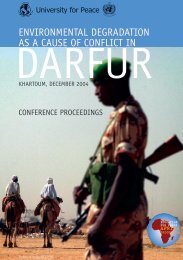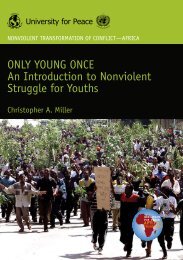who medicines strategy - libdoc.who.int - World Health Organization
who medicines strategy - libdoc.who.int - World Health Organization
who medicines strategy - libdoc.who.int - World Health Organization
Create successful ePaper yourself
Turn your PDF publications into a flip-book with our unique Google optimized e-Paper software.
COMPONENTS OF THE STRATEGY | 57Figure 13:Financing <strong>medicines</strong>: the Uganda experienceUS$2.30 gap translates <strong>int</strong>o – US$4.00 - US$5.00 in out-ofpockethousehold expenditures on drugs14%8%66%12%GAPPROJECTCENTRALED kits = US$0.08 per capitaDECENTRALIZEDAdequate and sustainable financing of <strong>medicines</strong>remains a remote prospect for almost half of theworld’s population.Since 1995, private sources of finance forpharmaceuticals have become more importantin all countries, with attendant risks to publichealth objectives. Governments’ share inpharmaceutical spending has fallen faster thantheir share in total health spending. Whileexternal assistance has boosted pharmaceuticalspending in a small number of countries, mostcountries with high HIV/AIDS mortality arestill spending less than US$ 5 per capita on<strong>medicines</strong>.Both published studies and WHO National<strong>Health</strong> Accounts confirm that pharmaceuticalsexpenditure in developing countries accountsfor 25%-65% of total public and private healthexpenditure, and for 60%-90% of out-of-pockethousehold spending on health. 21In Uganda, it was estimated that annual percapita medicine needs in 2002-2003 were US$3.50. Figure 13 shows that the available fundsfrom local, central, and externally funded projectsources totalled only US$1.20 per capita, leavingUS$2.30 per capita — or two-thirds of thefinancial resources for <strong>medicines</strong> — to be metfrom household sources. From these figures it wasestimated that a typical household’s out-of-pocketspending on <strong>medicines</strong> would have to be betweenUS$4 and US$5 for needs to be met. Such aheavy financial burden will obviously hit poorerhouseholds hardest.A much greater role for public finance is needed,involving both developing country governmentsand <strong>int</strong>ernational donors. In addition, increasedefficiency in public finance is needed in order toexpand access to essential <strong>medicines</strong>.In view of the heavy burden of<strong>medicines</strong> expenditure, especiallyin developing countries, and theunique aspects of managing thiscritical health resource, WHOprovides guidance on financingthe supply of <strong>medicines</strong>, in aneffort to increase the affordabilityof essential <strong>medicines</strong> in both thepublic and private sectors.











